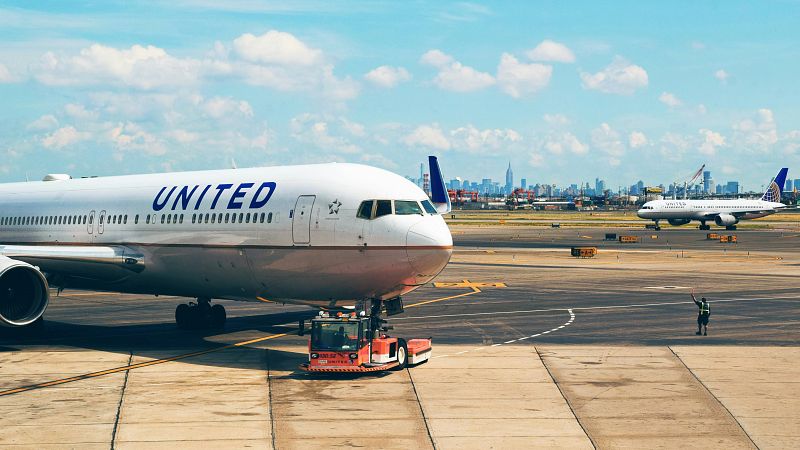Airlines are doing little to switch to sustainable fuels, but oil companies are at fault report says

87 per cent of airlines are failing in the transition to sustainable aviation fuels (SAFs), a new ranking by Transport & Environment (T&E) shows.
Only 10 out of 77 airlines are making noteworthy efforts to switch to truly sustainable alternatives from fossil kerosene.
The remaining 67 are either buying too little SAF, the wrong kind of SAF or are not considering SAFs at all in their decarbonisation plans.
A large part of the blame lies with oil companies, T&E says, who are not investing in the transition to green kerosene.
“The EU needs to prioritise the uptake of e-fuels for planes in its upcoming Clean Industrial Deal package,” T&E adds.
Airlines are using the wrong kinds of sustainable fuels
Not only are the majority of airlines doing too little when it comes to SAF, but many of them are not doing anything.
This raises serious questions about their ability to address their climate impact, T&E warns.
One big issue is that not all SAFs are equally sustainable. E-kerosene - a fuel made from renewable electricity - is the most sustainable and scalable type of SAF.
In contrast, SAF derived from biomass (biofuels) vary greatly in sustainability and scalability. SAFs made from food or feed crops such as corn are not sustainable at all.
Currently, most of the airlines ranked are using the wrong type of SAF.
E-kerosene makes up less than 10 per cent of airlines’ SAF agreements, while unsustainable crop-based biofuels made from corn grains and soy oil account for more than 30 per cent.
Airlines need to do more to push fuel producers to prioritise the right types of feedstocks, T&E says.
"Too few airlines are committing to truly sustainable fuels. The majority are either buying the wrong types of fuels or, worse still, no SAF at all,” says Francesco Catte, SAF manager at T&E.
“Airlines have to put their fist on the table to change this. They need to send the right signal to fuel suppliers that what is being sold to them will not make their flights green. Otherwise, they can wave goodbye to their net-zero goals."
Which airlines are doing the most to reduce their climate impact?
In the ranking, airlines were awarded points for SAF and e-kerosene targets and for committing to e-kerosene via offtake agreements, letters of intent and memorandums of understanding.
The top three airlines in T&E’s ranking are Air France-KLM, United Airlines and Norwegian, receiving high points for committing to e-kerosene or advanced and waste biofuels.
The study found that SAF uptake across the world is very low. In 2023, the airlines in the ranking consumed more than 1.6 billion barrels of fossil kerosene, compared to only 2.6 million barrels of SAF (less than 0.15 per cent of total jet fuel consumption).
The analysis also found that they have purchased enough SAF to meet only 1.2 per cent of their fuel needs by 2030.
That said, uptake varies significantly across regions of the world. The North American airlines in the ranking will use 2.7 per cent SAF in 2030, while their European counterparts will reach 1.3 per cent SAF.
This share is likely to grow, though, because of laws in the EU and the UK mandating the increasing use of SAF after 2030.
How can more airlines switch to the right SAFs?
T&E says greater production of the right kinds of SAFs is key to the transition, but traditional oil producers are not investing enough in green fuels.
The study found that Eni, TotalEnergies, Shell, BP, Chevron, ExxonMobil, Sinopec and Saudi Aramco could produce only around 3 tonnes of SAF per year by 2030 - less than 3 per cent of their current jet fuel output.
Worse still, virtually none of their investments into SAFs are e-kerosene. Shell recently withdrew from an e-kerosene project, reflecting the industry’s reluctance to shift to clean fuels and to prioritise fossil fuel investments.
“The minuscule amounts of SAFs that Big Oil companies are producing are bio-based fuels which are unsustainable and unscalable,” says T&E.
The e-kerosene market is currently led by smaller refiners and start-ups, which don’t have the financial power to produce enough to cater for the mass market in the long run.
“Oil companies are the missing piece of the puzzle in the green fuels ecosystem. They have gone unnoticed so far but their reluctance to invest into SAFs is hijacking the transition of the sector as a whole,” Catte says.
“Regulators must get tougher and ensure oil majors are investing in SAFs, whilst also developing a European industrial strategy for e-kerosene, to support this nascent industry with adequate funding and regulatory measures.
Yesterday

